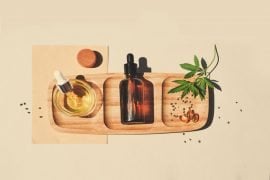What does CBD feel like? It’s impossible to say, exactly, what CBD (cannabidiol) feels like for everyone because we’re all different, but we’ll try. For starters, it won’t turn you into Harold and Kumar. You won’t have any experiences where the world goes into slow-motion and even cheetahs are chill.
CBD won’t make you feel high or give you any over-the-top feels of euphoria or giddiness. It’s typically made from the hemp plant, which has little THC.
And while we’re at it, CBD also doesn’t have the potential for addiction. Meaning you won’t get hooked no matter how often you use it.
What Does CBD Feel Like – Why CBD doesn’t make you high
Unlike THC—the cannabinoid that produces the psychoactive effects—CBD works differently in the body. So you get the therapeutic effects, but no high. That’s because each one impacts the cannabinoid type 1 (CB1) receptors in the brain differently. THC activates these receptors, while CBD is a CB1 antagonist and blocks the intoxicating effect.
It’s easy to see why the confusion since both THC and CBD are present in cannabis plants. But not all CBD products are made from the cannabis plant. We know — it’s confusing. CBD can also be derived from the hemp plant. But some CBD products made from the cannabis plant are processed so they contain CBD, but no THC. (Yeah, we said it was confusing.)
Still worried? A recent study published in the Journal of the American Medical Association looked at the effects of CBD and driving. They found that CBD on its own does not impact driving ability the way THC or a THC/CBD mixture does.
Full and broad spectrum CBD also contains terpenes, which are aromatic compounds that give cannabis it’s signature smell. Terpenes are why CBD can have a similar earthy taste and aroma that cannabis does. One thing to note: CBD isolate is only CBD, so it doesn’t contain any other cannabinoids or terpenes.
Also Read: Lord Jones CBD – Would We Recommend it to a Friend?
If not high, then what does CBD feel like?
Good question! But the answer isn’t exactly that black and white. There are several variables that impact how CBD affects a person. The product, the dose, and the individual factors all influence how CBD makes a person feel. (More on that coming up.)
Many people who use CBD experience feelings like a sense of calm and relaxation. Sometimes referred to as homeostasis. Which is why people often use it to help with anxiety and trouble sleeping.
These effects aren’t intense and won’t make you wig out or anything like that. They tend to be comfortable and gradual.
Factors that influence how CBD makes you feel
As promised, here are the factors that play a role in how CBD makes a person feel:
· Individual factors. Everything from your size, metabolism, and age affect how CBD is processed by your body and how it affects you. For instance, someone who weighs less may feel the effects more than a person who’s considerably heavier. And that’s even if they take the same dose. Your state of health and any medications can also play a role in how CBD feels for you. (This goes for any dietary supplements you may add to your diet.)
· Dosage. Dose plays a big role in what CBD (also known as cannabidiol) feels like. The higher the dose, the more likely you are to feel effects, including some potentially unpleasant side effects. But if you are looking for something like a sense of calm, then we will always recommend starting with a small dose and then working you way up.
· The product. CBD products are not all the same. Doses vary between products and brands, and so does quality. For instance, you’ll feel a difference between hemp-derived versus marijuana-derived CBD, and between full-spectrum, broad-spectrum, and isolate. Full and broad-spectrum products provide the entourage effect of all the cannabinoids working together. When they work together they provide a positive effect more than when just CBD is working on its own.
· Method of delivery. How you get your CBD affects how quickly and intensely you feel the effects. That’s because methods of delivery vary in bioavailability (how much of the CBD gets into the body). And how quickly they get the CBD into your bloodstream.
Also Read: 5 Supplements everyone will be taking next year
How different methods of consumption will make you feel
Different methods of consumption tend to produce most the same effects. Though you might not feel a lot of difference as far as the effects between, say, gummies and tinctures. One method may be better than another depending on what you’re using it for. People tend to use CBD for a wide range of issues including inflammation, pain, sleep and anxiety. And it depends on what your body is feeling like that day, as well.
Here’s what you can expect from the different forms. But before we dive in, we want to note that we always recommend using a CBD product for at least three weeks before deciding if it’s right for you or not. There’s a reason why they don’t do one-day clinical trials. It sometimes takes time to achieve full effectiveness when it comes to CBD.
CBD oils and tinctures
Oils and tinctures can produce effects within 15 to 30 minutes when placed under the tongue (or sometimes much longer). That’s because the CBD enters the bloodstream quickly through the mucous membranes in your mouth. This method can be especially helpful if you’re looking for faster relief from pain or anxiety. And the type of terpenes can affect the taste and flavor, if that’s a concern.
Vaping CBD
Though there’s the risk of lung damage associated with vaping to consider, vaping CBD produces the quickest effects. Vaping enters your bloodstream via your lungs within a matter of seconds. The quick onset is the reason so many people choose to vape CBD for anxiety and pain relief. Is vaping safer than smoking? We don’t know yet. So please, take that into consideration if you vape CBD oil.
CBD Gummies
CBD gummies and other edibles won’t give you the quick onset of other forms. That’s because they need to clear your digestive system and liver before entering the bloodstream. Which is a process that can take 30 minutes to 2 hours. They can, however, be useful if you’re treating chronic pain. Especially if you are trying to build up and eventually maintain consistent levels of CBD in your body.
CBD Balms/Creams
CBD topicals, like balms and creams offer localized effects, so you only feel them in the area where it’s applied. This is most useful if you’re looking to relieve muscle or joint pain, inflammation or treating a skin condition like eczema. And a lot of products incorporate camphor and menthol, which will provide a cooling effect that’s not from the CBD.
CBD Beverages
If you’re worried about how CBD will make you feel, give CBD beverages a try. CBD beverages typically contain less CBD than other forms. Not always, but typically, so check the label first. Additionally, CBD drinks have lower bioavailability and take longer to reach your endocannabinoid system. Which means even less CBD actually makes it into your system. Minimal effects aren’t necessarily a bad thing if you’re new to CBD and on the fence.
Why take CBD then?
If a high’s what you’re after, then CBD products aren’t the way to go. Even CBD products that contain THC are unlikely to get you there if that’s what you’re after.
The hype around CBD is about its health benefits. Research continues into the potential therapeutic effects of CBD. There’s still a lot left to learn, but what’s known so far is promising.
There’s anecdotal and scientific evidence that CBD can help relieve symptoms caused by various mental and physical health conditions. People take it to help with pain, insomnia, and anxiety. It’s also used to help with appetite with medical conditions, such as cancer and AIDS. We want to reiterate that the FDA has not approved CBD to treat any health issues (except for seizures through the drug Epidiolex.)
And in case you’re wondering, the 2018 Farm bill made all CBD products that contain less than 0.3% THC legal on a federal level. Some states are a little different than others. But from a federal perspective, CBD products that contain less than 0.3% THC are completely legal. That’s why you can now purchase CBD products that fall in that category online. And they can get shipped to you via the USPS.
Also Read: These are the 5 healthiest hand soaps on the market.
What about side effects?
CBD is safe and according to the World health Organization and other health organizations, it’s typically well-tolerated. That said, like other medications and supplements, side effects are a possibility, especially when it’s not used as directed.
Side effects of CBD are generally mild and can include:
- dry mouth – when your mouth feels insanely dry no matter how much liquid you drink
- fatigue – general feeling of tiredness
- mild nausea – usually not to the point of vomiting
- diarrhea – well, we all know what this is…
You can reduce the likelihood of side effects by using it as directed. Always follow the prescribed dosages. Even if you’ve used CBD before, it’s always good to start with whatever dosage the product recommends (or maybe even a little lower.)
In Conclusion – What Does CBD Feel Like?
If you’re new to CBD, it’s best to start low and go slow. This means starting with the lowest dose and sticking with it for at least 2-4 weeks to see how it feels. If you’re not getting the effects you’re after, increase the dose gradually until you reach a dose that works for you. And as always, consult your doctor before starting or increasing any CBD regimen. But over time, your endocannabinoid system will thank you.
FOOD AND DRUG ADMINISTRATION (FDA) DISCLOSURE:
These statements have not been evaluated by the FDA and are not intended to diagnose, treat, cure or prevent any disease. Always check with your physician before starting a new dietary supplement program.

Adrienne Santos-Longhurst is a freelance health and lifestyle writer that has written for Healthline, Medical News Today and Verily Magazine just to name a few.





